#calabash literary festival
Text


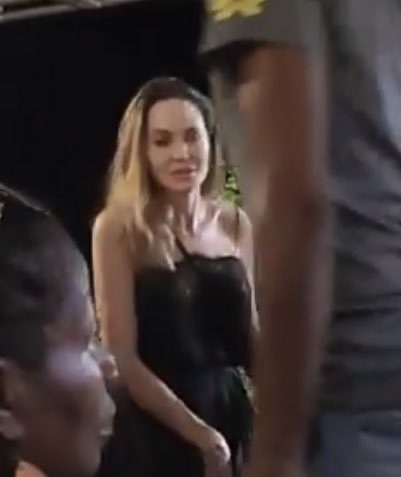

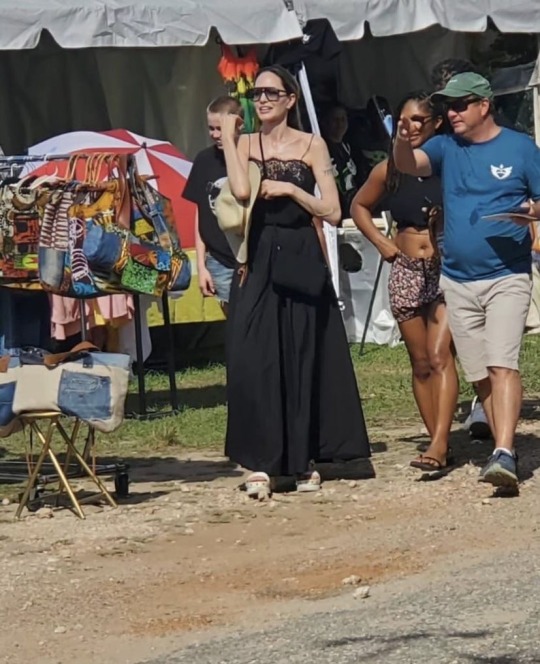
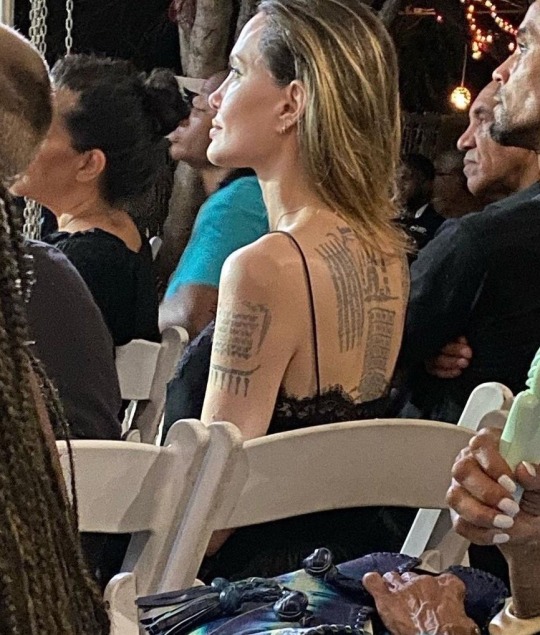
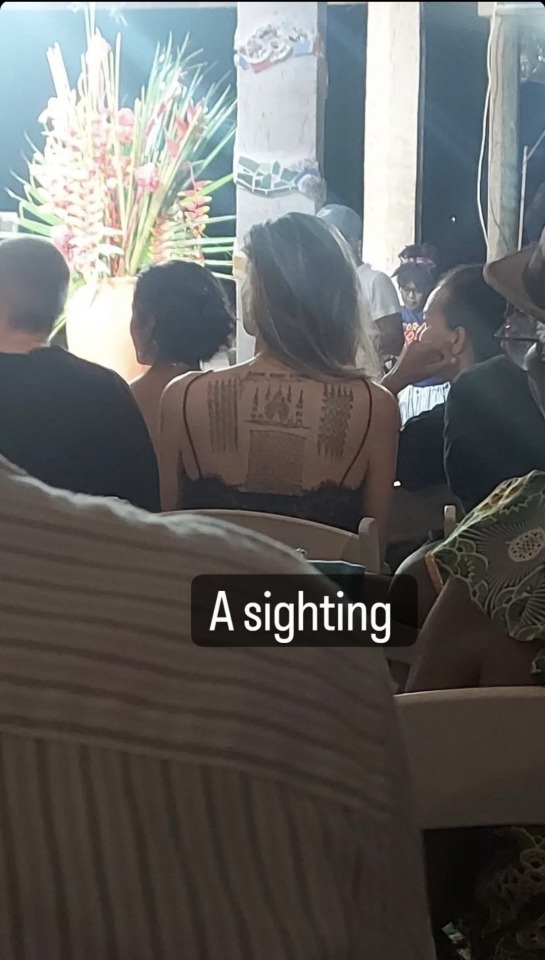
Angelina Jolie with daughters Zahara and Shiloh at the Calabash International Literary Festival in St Elizabeth (5.27.23)
#angelina jolie#actress#movie star#zahara jolie pitt#angie jolie#humanitarian#nyc#shiloh jolie pitt#Jamaica#calabash#calabash literary festival#Akala
29 notes
·
View notes
Text
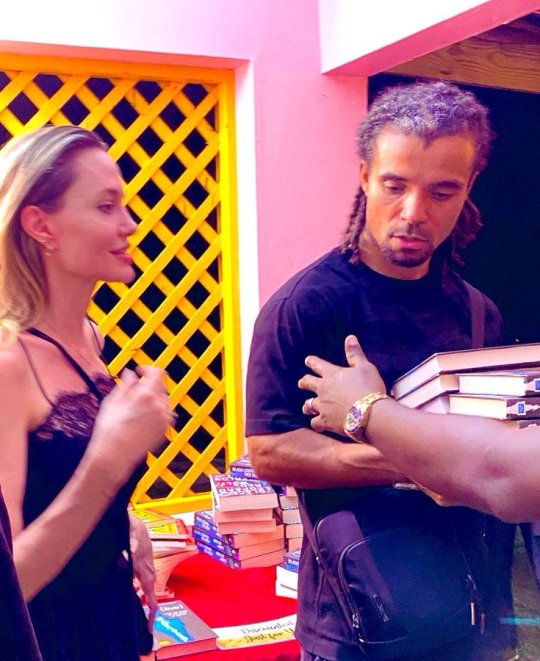
Angelina Jolie and Akala at Kings Bookshop May 2023
-Calabash Literary Festival on Saturday in Jamaica
0 notes
Text
Calabash showcases vibrancy of literature, St Elizabeth community spirit | Entertainment | Jamaica Gleaner
0 notes
Text
A splendid reasoning with Akala
New Post has been published on https://goodnewsjamaica.com/mobile-reasonings/a-splendid-reasoning-with-akala/
A splendid reasoning with Akala
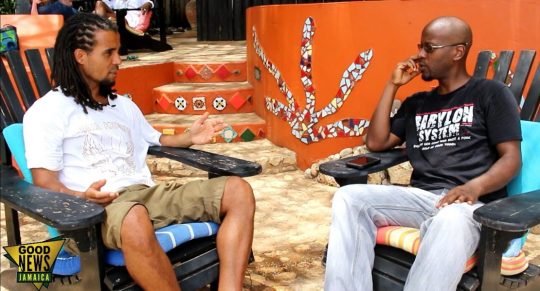
It’s not every day that you can sit down with a global celebrity that you hold in high regard. Unless of course you live in Jamaica. As much as that sounds like an extremely biased statement, it really isn’t. Living on an island that is home to the Calabash Literary Festival, which attracts a global audience; you never know who you’ll meet. GNJ got the chance to sit down and reason with a young man who can only be described as astounding. Akala grew up on the UK in the 80’s and amidst many obstacles. He has become one of the worlds most sought after historians. He is also a lover and performer of Shakespeare. Don’t forget he is also an author of three books. Also check out his music CD’s as he is a Hip-Hop artist.
Let me send a special and specific ‘Big Up’ to Chanelle Newman, Sena Dawes, and especially Justine Hensell for allowing this opportunity to manifest and be absolutely awesome. We appreciate how much you all did to make sure this happened for GNJ and we appreciate you.
If you have not been to the Calabash Literary Festival yet, you have two years to get ready for the next one. Take it from me, you don’t want to miss it. Every room in the beautiful town of Treasure Beach will be booked, so reserve early. The festival is a melting bot of people who love books, poetry, music, and anything culture. I have not met anyone who was disappointed with their time spent during the festival. It is just an amazing weekend of mind-blowing presentations.
So that I don’t have you reading to much longer, take a look below and watch the video. Please don’t forget to share the video. Also, please share the video throughout social channels.
An interview/Reasoning with Akala
youtube
4 notes
·
View notes
Text
Jamaica’s Calabash International Literary Festival 2021 cancelled
Jamaica’s Calabash International Literary Festival 2021 cancelled
For the second year running, Calabash International Literary Festival has been cancelled as a result of the Covid-19 driven global health crisis. It will now happen on May 27-29, 2022.
The Calabash International Literary Festival, which runs every two years, was founded by novelist Colin Channer, poet Kwame Dawes, and Justine Henzell in 2001. Since its beginning, it has hosted some of the biggest…
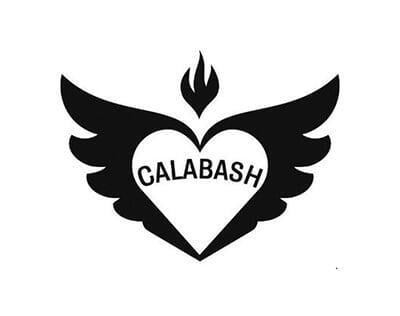
View On WordPress
0 notes
Text
Carl Hancock Rux
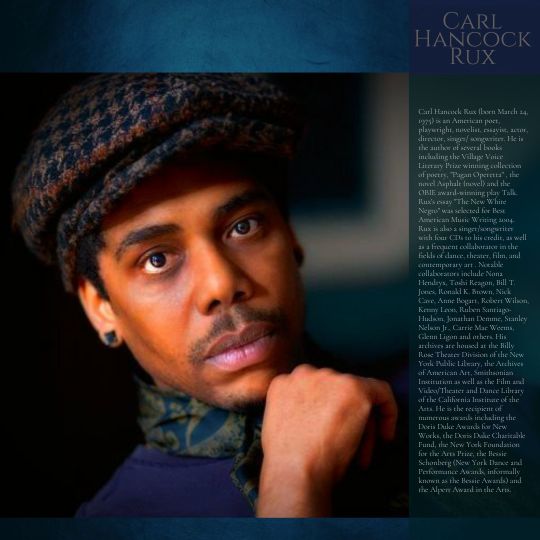
Carl Hancock Rux (born March 24, 1975) is an American poet, playwright, novelist, essayist, actor, director, singer/ songwriter. He is the author of several books including the Village Voice Literary Prize-winning "Pagan Operetta," the novel, Asphalt, and the Obie Award-winning play, Talk. Rux is also a singer/songwriter with four CDs to his credit, as well as a frequent collaborator in the fields of dance, theater, film, and contemporary art . Notable collaborators include Nona Hendryx, Toshi Reagon, Bill T. Jones, Ronald K. Brown, Nick Cave, Anne Bogart, Robert Wilson, Kenny Leon, Ruben Santiago-Hudson, Jonathan Demme, Stanley Nelson Jr., Carrie Mae Weems, Glenn Ligon and others. He is the recipient of numerous awards including the Doris Duke Award for New Works, the Doris Duke Charitable Fund, the New York Foundation for the Arts (NYFA) Prize, the Bessie Award and the Alpert Award in the Arts, and a 2019 Global Change Maker award by WeMakeChange.Org. . His archives are housed at the Billy Rose Theater Division of the New York Public Library, the Archives of American Art, Smithsonian Institution as well as the Film and Video/Theater and Dance Library of the California Institute of the Arts.
Early life
Rux was born Carl Stephen Hancock in Harlem, New York. His biological mother, Carol Jean Hancock, suffered from chronic mental illness, was diagnosed paranoid schizophrenic, and was institutionalized shortly after the birth of his older brother. Rux was born the result of an illegitimate pregnancy (while his mother was under the care of a New York City psychiatric institution) and the identity of Rux's biological father is unknown. Rux was placed under the guardianship of his maternal grandmother, Geneva Hancock (née Rux), until her death of cirrhosis of the liver due to alcoholism. At four years of age he entered the New York City foster care system where he remained until he was eventually placed under the legal guardianship of his great uncle (grandmother's brother) James Henry Rux and his wife Arsula (née Cottrell) and raised on a step street in the Highbridge section of the Bronx, later used as the filming location for the stairway dance scene in the 2019 film Joker.
Rux attended PS 73, Roberto Clemente Junior High School and received a scholarship to the Horace Mann School, an independent Ivy college preparatory school in the Riverdale section of the Bronx before transferring to the Fiorello H. LaGuardia High School of Music & Art and Performing Arts where he studied visual art. Exposed to jazz music by his legal guardians, including the work of Oscar Brown Jr., John Coltrane, Billie Holiday, Miles Davis, Max Roach and Abbey Lincoln, Rux eventually double-majored in music/voice, and sang with the Boys Choir of Harlem. He also became a member of the Harlem Writers Workshop, a summer journalism training program for inner-city youth founded by African-American journalists, sponsored by Columbia University and The Xerox Corporation. At the age of 15, Rux was legally adopted by his guardians and his surname changed to Rux. Upon graduation from high school he entered Columbia College where he studied in the Creative Writing Program; took private acting classes at both HB studios; and trained with Gertrude Jeanette's Hadley Players as well as actor Robert Earl Jones (father of actor James Earl Jones). Rux continued his studies at Columbia University, American University of Paris, as well as the University of Ghana at Legon.
Career
Working as a Social Work Trainer while moonlighting as a freelance art and music critic, Rux became a founding member of Hezekiah Walker's Love Fellowship gospel choir and later found himself influenced by the Lower East Side poetry and experimental theater scene, collaborating with poets Miguel Algarin, Bob Holman, Jayne Cortez, Sekou Sundiata, Ntozake Shange; experimental musicians David Murray, Mal Waldron, Butch Morris, Craig Harris, Jeanne Lee, Leroy Jenkins as well as experimental theater artists Laurie Carlos, Robbie McCauley, Ruth Maleczech, Lee Breuer, Reza Abdoh and others.
He is one of several poets (including Paul Beatty, Tracie Morris, Dael Orlandersmith, Willie Perdomo, Kevin Powell, Maggie Estep, Reg E. Gaines, Edwin Torres and Saul Williams) to emerge from the Nuyorican Poets Cafe, most of whom were included in the poetry anthology Aloud, Voices From the Nuyorican Poets Cafe, winner of the 1994 American Book Award. His first book of poetry, Pagan Operetta, received the Village Voice Literary prize and was featured on the weekly's cover story: "Eight Writers on the Verge of (Impacting) the Literary Landscape". Rux is the author of the novel Asphalt and the author of several plays. His first play, Song of Sad Young Men (written in response to his older brother's death from AIDS), was directed by Trazana Beverly and starred actor Isaiah Washington. The play received eleven AUDELCO nominations. His most notable play is the OBIE Award-winning Talk, first produced at the Joseph Papp Public Theater in 2002. Directed by Marion McClinton and starring actor Anthony Mackie, the play won seven OBIE awards.
Rux is also a recording artist, first featured on Reg E. Gaines CD Sweeper Don't Clean My Streets (Polygram). As a musician, his work is known to encompass an eclectic mixture of blues, rock, vintage R&B, classical music, futuristic pop, soul, poetry, folk, psychedelic music and jazz. His debut CD, Cornbread, Cognac & Collard Green Revolution (unreleased) was produced by Nona Hendryx and Mark Batson, featuring musicians Craig Harris, Ronnie Drayton and Lonnie Plaxico. His CD Rux Revue was recorded and produced in Los Angeles by the Dust Brothers, Tom Rothrock and Rob Schnapf. Rux recorded a follow up album, Apothecary Rx, (selected by French writer Phillippe Robert for his 2008 publication "Great Black Music": an exhaustive tribute of 110 albums including 1954's "Lady Sings The Blues" by Billie Holiday, the work of Jazz artists Oliver Nelson, Max Roach, John Coltrane, rhythm and blues artists Otis Redding, Ike & Tina Turner, Curtis Mayfield, George Clinton; as well as individual impressions of Fela Kuti, Jimi Hendrix, and Mos Def.) His fourth studio CD, Good Bread Alley, was released by Thirsty Ear Records, and his fifth "Homeostasis" (CD Baby) was released in May 2013. Rux has written and performed (or contributed music) to a proportionate number of dance companies including the Alvin Ailey American Dance Theater; Bill T. Jones/Arnie Zane Dance Company; Jane Comfort & Co. and Ronald K. Brown's "Evidence" among others.
Literature
Books by author
Elmina Blues (poetry)
Pagan Operetta (poetry/Short Fiction/SemioText)
Asphalt (novel/Simon & Schuster)
Talk (drama/TCG Press)
Literary fiction
Asphalt (novel) (Atria, Simon & Schuster)
The Exalted (novel) forthcoming
Selected plays
Song of Sad Young Men
Talk
Geneva Cottrell, Waiting for the Dog to Die
Smoke, Lilies and Jade
Song of Sad Young Men
Chapter & Verse
Pipe
Pork Dream in the American House of Image
Not the Flesh of Others
Singing In the Womb of Angels
Better Dayz Jones (Harlem Stage)
"Stranger On Earth" (Harlem Stage)
The (No) Black Male Show
Mycenaean
Asphalt (directed by Talvin Wilkes)
Etudes for the Sleep of Other Sleepers (directed by Laurie Carlos)
Steel Hammer (co-written by Will Power, Kia Cothran and Regina Taylor for the SITI company, directed by Anne Bogart).
The Exalted (directed by Anne Bogart)
NPR Presents WATER ± (co-written by Arthur Yorinks, directed by Kenny Leon)
Selected essays
"Eminem: The New White Negro
"Dream Work and the Mimesis of Carrie Mae Weems"
"Belief and the Invisible Playwright"
"In Memoriam: Ruby Dee (1922–2014)"
"Up From The Mississippi Delta"
"Democratic Vistas of Space and Light"
"A Rage In Harlem"
Selected anthologies
Experiments in a Jazz Aesthetic: Art, Activism, Academia, and the Austin Project University of Texas Press
Soul: Black Power, Politics, and Pleasure NYU Press
Heights of the Marvelous NYU Press
Juncture: 25 Very Good Stories and 12 Excellent Drawings Soft Skull Press
Da Capo Best Music Writing 2004: The Year's Finest Writing on Rock, Hip-hop, Jazz, Pop, Country, and More, DeCapo Press
Words in Your Face: A Guided Tour Through Twenty Years of the New York City Poetry Slam, Counterpoint Press
Humana Festival 2014: The Complete Plays, Playscripts, Incorporated
Action: The Nuyorican Poets Cafe Theatre, Simon & Schuster
Bum Rush the Page: A Def Poetry Jam, Three Rivers Press
The African American Male, Writing, and Difference: A Polycentric Approach to African American Literature, Criticism, and History, State University of New York Press
Meditations and Ascensions: Black Writers on Writing, Third World Press
Plays from the Boom Box Galaxy: Theater from the Hip-hop Generation, Theatre Communications Group
Bad Behavior, Random House
Verse: An Introduction to Prosody, John Wiley & Sons Press
Significations of Blackness: American Cinema and the Idea of a Black Film, UMI Press
So Much Things to Say: 100 Poets from the First Ten Years of the Calabash International Literary Festival, Akashic Books
Black Men In Their Own Words, Crown Publishers
Bulletproof Diva, Knopf Doubleday
Race Manners: Navigating the Minefield Between Black and White Americans, Skyhorse Publishing
In Their Company: Portraits of American Playwrights, Umbrage Press
Listen Again: a Momentary History of Pop Music, Duke University Press
Journalism
Rux has been published as a contributing writer in numerous journals, catalogs, anthologies, and magazines including Interview magazine, Essence magazine, The New York Times, the Los Angeles Times, aRude Magazine, Nka Journal of Contemporary African Art (founded by fellow art critics Okwui Enwezor, Chika Okeke-Agulu and Salah Hassan) and American Theater Magazine.
Libretti
Makandal (music by Yosvaney Terry, stage design and costumes by Edouard Duval Carrie, directed by Lars Jan) Harlem Stage
Blackamoor Angel (music by Deidre Murray; directed by Karin Coonrod) Bard Spiegeltent/Joseph Papp Public Theater
Kingmaker (music by Toshi Reagon) BRIC Arts Media
Perfect Beauty" (music by Tamar Muskal)
Music
Solo albums
Cornbread, Cognac, Collard Green Revolution
Rux Revue Sony/550 Music
Apothecary Rx Giant Step
Good Bread Alley Thirsty Ear
Homeostasis CD Baby
Singles
"Miguel" (Sony) 1999
"Wasted Seed" (Sony) 1999
"Fall Down" (Sony) 1999
"No Black Male Show" (Sony) 1999
"Good Bread Alley" (Thirsty Ear) 2006
"Thadius Star" (Thirsty Ear) 2006
"Living Room" (Thirsty Ear) 2006
"Disrupted Dreams" (Giant Step) 2010
"Eleven More Days" (Giant Step) 2010
"I Got A Name" (Giant Step) 2010
"Living Room" (Kevin Shields Remix) (Mercury) 2013
12-inch singles
"Lamentations (You, Son)" Giant Step Records
EP
Carl Hancock Rux Live at Joe's Pub (forthcoming)
Collaborations
Sweeper Don't Clean My Streets Reg E. Gaines Polygram
Eargasms Vol. 1
70 Years Coming R. L. Burnside Bongload/Acid Blues Records
Our Souls Have Grown Deep Like the Rivers: Black Poets Read Their Works, Rhino
Bow Down to the Exit Sign David Holmes Go! Beat
Love Each Other Yukihiro Fukutomi Sony/ Japan
Optometry DJ Spooky Thirsty Ear Recordings
The Temptation of Saint Anthony (Studio Cast Recording)
Inradio 5 Morningwatch 2004
Thirsty Ear Presents: Blue Series Sampler (Thirsty Ear)
Poetry on Record: 98 Poets Read Their Work, 1888-2006 Box Set Shout! Factory (2006)
More Than Posthuman-Rise of the Mojosexual Cotillion Burnt Sugar The Arkestra Chamber, TruGROID
The Dogs Are Parading David Holmes Universal
Life Forum Gerald Clayton Concord Jazz
Tributary Tales Gerald Clayton
Tomorrow Comes The Harvest Jeff Mills Tony Allen Decca Records
Humanist Rob Marshall Ignition Records
Songwriter
Mckay Stephanie McKay Universal Music
Contemporary Dance (text & music)
Movin' Spirits Dance Co.
Kick The Boot, Raise the Dust An' Fly; A Recipe for Buckin (chor: Marlies Yearby, co-authors: Sekou Sundiata, Laurie Carlos, music: Craig Harris ) Performance Space 122, Maison des arts de Créteil (France)
Totin' Business & Carryin' Bones (chor. Marlies Yearby), Performance Space 122, Maison des arts de Créteil (France)
The Beautiful (chor: Marlies Yearby, co-author:Laurie Carlos), Judson Church, Tribeca Performing Arts Center
Of Urban Intimacies (chor: Marlies Yearby), Lincoln Center Serious Fun!, Central Park Summerstage, National Tour
That Was Like This/ This Was Like That(chor: Marlies Yearby, music: Grisha Coleman), Tribeca Performing Arts Center, Central Park Summerstage, National Tour
Anita Gonzalez
Yanga, (chor: Anita Gonzalez, music: Cooper-Moore, composer), Tribeca Performing Arts Center, Montclair State College
Jane Comfort & Co.
Asphalt (dir/chor: Jane Comfort; vocal score: Toshi Reagon, music: DJ Spooky, David Pleasant, Foosh, dramaturgy: Morgan Jenness, costumes: Liz Prince, lighting design: David Ferri ), Joyce Theater, National Tour
Urban Bush Women
Soul Deep (chor: Jawole Willa Jo Zollar, composer: David Murray), Walker Arts Center, National Tour
Shelter (chor: Jawole Willo Jo Zollar, music: Junior Gabbu Wedderburn) International Tour
Hair Stories (chor: Jawole Willa jo Zollar) BAM Theater/Esplanade Theater (Singapore) Hong Kong Arts Festival
Jubilation! Dance Co.
Sweet In The Morning (chor: Kevin Iega Jeff)
Alvin Ailey American Dance Theater
Shelter (chor: Jawole Willo Jo Zollar, music: Junior Gabbu Wedderburn) City Center, International Tour
Uptown (chor: Matthew Rushing) Alvin Ailey American Dance Theater
Four Corners (chor: Ronald K. Brown) Alvin Ailey American Dance Theater 2014
Alvin Ailey Repertory Ensemble (Ailey II)
Seeds (chor: Kevin Iega Jeff) Aaron Davis Hall, Apollo Theater, National Tour
Bill T. Jones/Arnie Zane Dance Theater
The Artificial Nigger (chor: Bill T. Jones) Arnie Zane Bill T. Jones Dance Co; music: Daniel Bernard Roumain National Tour
Roberta Garrison Co.
Certo! (chor: Roberta Garrison, music: Mathew Garrison) Scuola di Danza Mimma Testa in Trastevere (Rome, Italy) Teatro de natal infantil Raffaelly Beligni (Naples, Italy)
M'Zawa Dance Co.
Seeking Pyramidic Balance/Flipmode (chor: Maia Claire Garrison) 651 Arts
Robert Moses Kin
Helen (chor: Robert Moses) Yerba Buena Performing Arts Center
Nevabawarldapece (chor: Robert Moses) Yerba Buena Performing Arts Center
Topaz Arts Dance
Dreamfield (chor: Paz Tanjuaquio) Hudson River Park NY
Actor
Theater
Rux studied acting at the Hagen Institute (under Uta Hagen); the Luleå National Theatre School (Luleå, Sweden) and at the National Theater of Ghana (Accra). Rux has appeared in several theater projects, most notably originating the title role in the folk opera production of The Temptation of St. Anthony, based on the Gustave Flaubert novel, directed by Robert Wilson with book, libretto and music by Bernice Johnson Reagon and costumes by Geoffrey Holder. The production debuted as part of the Ruhr Triennale festival in Duisburg Germany with subsequent performances at the Greek Theater in Siracusa, Italy; the Festival di Peralada in Peralada, Spain; the Palacio de Festivales de Cantabria in Santander, Spain; Sadler's Wells in London, Great Britain; the Teatro Piccinni in Bari, Italy; the Het Muziektheater in Amsterdam, Netherlands; the Teatro Arriaga in Bilbao and the Teatro Espanol in Madrid, Spain. The opera made its American premiere at the Brooklyn Academy of Music / BAM Next Wave Festival in October 2004 and official "world premiere" at the Paris Opera, becoming the first all-African-American opera to perform on its stage since the inauguration of the Académie Nationale de Musique - Théâtre de l'Opéra. Combining both his dramatic training and dance movement into his performance, Rux's performance was described by the American press as having "phenomenal charisma and supreme physical expressiveness...(achieving) a near-iconic power, equally evoking El Greco's saints in extremis and images of civil rights protesters besieged by fire hoses." Rux has also appeared in several plays and performance works for theater, as well as in his own work.
Film/Television
Radio
Carl Hancock Rux was the host and artistic programming director of the WBAI radio show, Live from The Nuyorican Poets Cafe; contributing correspondent for XM radio's The Bob Edwards Show and frequent guest host on WNYC as well as NPR and co-wrote and performed in the national touring production of NPR Presents Water±, directed by Kenny Leon.
Performance Art Exhibitions/Curator
The Whitney Museum "Beat Culture and the New America, 1950-1965"
Solomon R. Guggenheim Museum "Carrie Mae Weems: Live"
Thread Waxing Space "Sacred Music"
The Foundry Theater "Roundtable on Hope"
The Kitchen "Sapphire: Black Wings & Blind Angels"
Harlem Stage "We Da People Cabaret"
The New School "Comrades and Lovers" Glenn Ligon
Mass MoCA "Until" Nick Cave
Kennedy Center/Spoleto Festival "Grace Notes"; Carrie Mae Weems
Grace Farms "Past Tense"; Carrie Mae Weems
Selected Directorial Credits
"Chapter & Verse" by Carl Hancock Rux /Dixon Place; Nuyorican Poets Cafe
"Mycenaean" by Carl Hancock Rux CalArts/BAM Next Wave Festival
"Third Ward" by Tish Benson/Nuyorican Poets Cafe
"Girl Group" by Tish Benson, Latasha Nevada Diggs, Sarah Jones/Aaron Davis Hall
"Stranger On Earth" by Carl Hancock Rux/ Live Arts; Harlem Stage
"Poesia Negra" by Carl Hancock Rux /RedCat; Lincoln Center; Aaron Davis Hall; BAM Next Wave. *"Who 'Dat Who Killed Better Days Jones?" by (Various Artists)/ Aaron Davis Hall
"blu" by Virginia Grise/ New York Theatre Workshop
"Welcome to Wandaland" by Ifa Bayeza/ Rights & Reasons Theater/Brown University
"String Theory" by Ifa Bayeza/ Rights & Reasons Theater, Brown University
"Bunky Johnson Out of The Shadows" by Ifa Bayeza/Shadows on the Teche
Academia
Rux is formally the Head of the MFA Writing for Performance Program at the California Institute of Arts and has taught and or been an artist in residence at Brown University, Hollins University, UMass at Amhurst, Duke University, Stanford University, University of Iowa, University of Wisconsin at Madison, and Eugene Lang New School for Drama, among others.
He has mentored award-winning writers including recipients of the Yale Drama Prize, Whiting Writers Award, Princess Grace Award, and BBC African Performance Playwriting Award.
Personal life
Rux's great uncle, Rev. Marcellus Carlyle Rux (January 8, 1882 - January 5, 1948) was a graduate of Virginia Union University, and principal of The Keysville Mission Industrial School (later changed to The Bluestone Harmony Academic and Industrial School), a private school founded in 1898 by several African-American Baptist churches in Keysville Virginia at a time when education for African-Americans was scarce to non-existent. For about 50 years the school had the largest enrollment of any black boarding school in the east and sent a large number of graduates on to college. For the first five years, Marcellus Carlyle Rux was a teacher in the institution. Such was the record he made that he was promoted to the principalship in 1917. Under his administration, the school reached its highest enrollment and had its greatest period of prosperity. The post-Civil war school was one of the first of its kind in the nation and was permanently closed in 1950. The school's still existent structure once featured a girl's and boy's dormitory and President's dwelling and is eligible for listing on the National Register of Historic Places. Marcellus Carlyle Rux is listed in History of the American Negro and his Institutions.
Rux's younger brother is a New York City Public School Teacher and his cousin a New York City middle school principal. Rux's older brother died of AIDS-related complications.
Rux's home, a Victorian Brownstone in the Fort Greene Brooklyn section of New York City, has been photographed by Stefani Georgani and frequently featured in home decor magazines and coffee table books internationally, including Elle Decor UK.
Activism
Rux joined New Yorkers Against Fracking, organized by singer Natalie Merchant, calling for a fracking ban on natural gas drilling using hydraulic fracturing. A concert featuring Rux, Merchant, actors Mark Ruffalo and Melissa Leo and musicians Joan Osborne, Tracy Bonham, Toshi Reagon, Citizen Cope, Meshell Ndegeocello and numerous others was held in Albany, N.Y., and resulted in public protests.
Rux was a co-producer (through a partnership between MAPP International and Harlem Stage) and curator of WeDaPeoples Cabaret, an annual event regarding citizens without borders in a globally interdependent world. A longtime resident and homeowner in Fort Greene Brooklyn, Carl Rux worked with the Fort Greene association and New York philanthropist Barbaralee Diamonstein-Spielvogel to erect a cultural medallion at the Carlton Avenue home where novelist Richard Wright lived and penned his seminal work, Native Son. Rux is a member of Take Back the Night, a foundation seeking to end sexual assault, domestic violence, dating violence, sexual abuse and all other forms of sexual violence.
Honors, awards, and grants
Rux was featured in Interview Magazine's "One To Watch" and New York Times Magazine's "Thirty Under Thirty". His essay Eminem: The New White Negro was selected for Da Capo's Best Music Writing 2004. Rux's radio documentary "Walt Whitman: Songs of Myself" was awarded the New York Press Club Journalism award for Entertainment News.
14 notes
·
View notes
Text
Où est-elle ::: Koté Li Yé || r. erica doyle
Il y a longtemps j’ai rencontré
Un joli garçon
Ensemble nous dormions
Dans le ventre de ma mère
Maintenant les rues de nos pères
Se soulèvent pour le manger
::
Tout ce qui est noir
est interdit au Paradis
Dans mes bras mon frère
dort, ses dents des perles
Je fais don de la nuit
pour que ce somme il puisse avoir
::
J’abandonne l’homme
qui m’a fait blanche
J’abandonne l’homme
qui a libéré ma mère
Je prie à côté de mon crâne
Mon scalp se déroule
::
Je lui fais un nid gris
au-dedans de mon cerveau
ma mère dort
et rêve de gènes
lèvres mauves vives sur le rachis
il respire. Le ciel
::
ploie dans mes yeux
cherchant sa peau
Les pales d’hélicoptères
envahissent notre paix :::
Où est ce Noir
Où est-ce
Où
::
Les pales tranchent, gémissent
martèlent les coupoles
Je le fais glisser au bas et hors
de mes vertèbres le petit
Il se précipite au bas de l’os
et de l’océan
::
navigue jusqu’à la maison
dans un bateau taillé dans du gommier
Quand il atteint notre île
tout le monde est soulagé
bien qu’ils ne m’aient pas
oubliée, belsé
::
Où est
ta sœur, hein ?
Où’qu’ ?
Koté belsé yé?
Où’qu’?
Koté li yé
Koté li yé
Sur le sable
Sur la mer parmi les étoiles
Koté li yé
Koté li yé
Dans l’egun monocellulaire
Dans la lune torpide
Koté li yé
Koté li yé
::
Là :::
Koté li yé
se drape autour d’un bâton ;
scintille électrique dans le halo d’un taser ;
tari à l’aide une bouteille en verre ;
::
Là :::
Koté li yé
vagin bouche bée dans la nuit ;
nuque pendille tendue à des sacs
plastiques et des cordes pauvrement nouées ;
::
Là :::
Koté li yé
belsé
Koté?
::: Je brûle
ma peau brille plus noire, plus laquée
::: non-mwen sé flambó
les cendres tremblent dans le clair de lune
::: without humanity
fumant mes os enfument le futur
::: pa bwè afwéchi pou lafiyèv dòt moun
original version on poets.org

photo: widevision photography
“I shared my mother’s womb with a brother and feel infinitely protective of him; the killings of black men at the hands of the state feels personal, as does working against the causes of this violence, and this poemacknowledges the labor of black women to uplift and protect their communities. Like many other black women in the United States, I, too, have been subjected to racial profiling by law enforcement and am deeply affected by the stories of sexual abuse and murder of women—particularly black, trans, and indigenous women—by those in power. I wrote this poem in solidarity with the #SAYHERNAME movement, which seeks to elevate and address the abuse of and violence against women by authorities. The poem asks, both in English and in Trinidadian French Patois—my grandmother’s native language —‘where is your sister?’ which reminds us to always ask about women and girls. It ends with a Patois proverb that translates roughly to ‘you cannot cure your own illness with the medicine of another’—reminding us that to address injustice, we must use a fine-grained, intersectional approach.”
—r. erica doyle

r. erica doyle was born in Brooklyn to Trinidadian immigrant parents. She earned a BA at Georgetown University, an MFA at The New School, and an MA at New York University. In her poems, she engages themes of intimacy, hunger, and power through the body.
Selected by poet Maggie Nelson, her debut collection, proxy (Belladonna* Books, 2013), won the 2014 Norma Farber First Book Award from the Poetry Society of America and was a Finalist for the Lambda Literary Award in Lesbian Poetry. PROXY is an unrequited love story in prose poems, where the landscape of the beloved body becomes the windows of New York City, the deserts of North Africa, and the mangroves of the Caribbean. PROXY is a conversation with the calculus, plotting and space against the infinite capacities of desire.

In a conversation with Amy King for Boog City, Doyle discussed her approach to proxy’s subject matter, stating, “Hardly anyone was writing about sex the way I knew we were doing it, and feeling it, and sometimes fucking each other up and over. Sex and the body are what make us dangerous—no one would care if we were writing platonic letters to each other about maple leaves. The body is the site where all of this gets worked out, but then, in proxy, everything becomes that body. The sea, the sand, the subway, the boys, the older women on the boardwalks, the platforms.” “Doyle’s most profound gift, in proxy: the relationship between the speaker and her body, a vehicle of desire that is simultaneously female and human,” observed Corrina Bain in a 2014 review of proxy for Muzzle Magazine, noting that doyle often portrays intimacy in close, sharp focus, where “longing, regret, and some brutish physical facts are revealed, but the narrative surrounding them is more or less dissolved.”
Doyle’s work has been featured in the anthologies Our Caribbean: A Gathering of Lesbian and Gay Writing from the Antilles (2008), Gathering Ground: A Reader Celebrating Cave Canem’s First Decade (2006), Bum Rush the Page: A Def Poetry Jam (2001), and Best American Poetry (2001). Her honors include fellowships from the New York Foundation for the Arts, Cave Canem, and the Fine Arts Work Center in Provincetown and an Astraea Lesbian Foundation for Justice Lesbian Writers Fund Award in Poetry. In addition, she has read her work at the Kennedy Center, the National Black Arts Festival, Joe’s Pub, the Nuyorican, the Calabash International Literary Festival in Jamaica, WI and various colleges and universities.
Doyle lives in Brooklyn, where she is an administrator in the NYC public schools and facilitates Tongues Afire: A Free Creative Writing Workshop for queer women and trans and gender non-conforming people of color.
https://rericadoyle.com/
https://www.poetryfoundation.org/poets/r-erica-doyle
1 note
·
View note
Text

Jamaica’s Calabash Literary Festival to Be Honored with Award for Supporting Black Literature http://dlvr.it/S8XGkm
0 notes
Text

Jamaica's Calabash Festival a literary treasure on the beach http://dlvr.it/RRPRrS
0 notes
Text

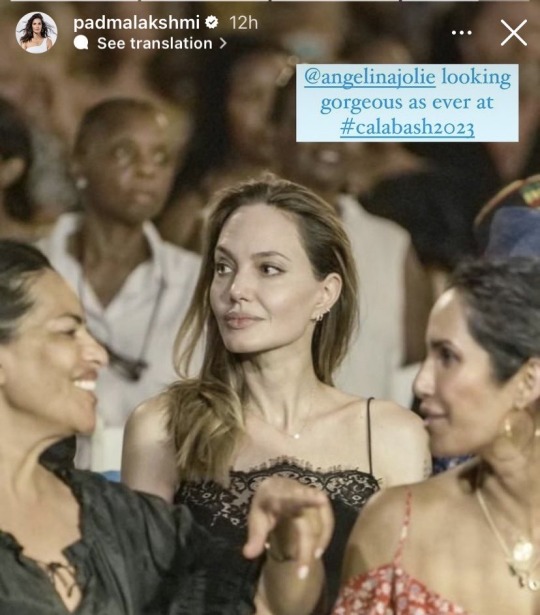
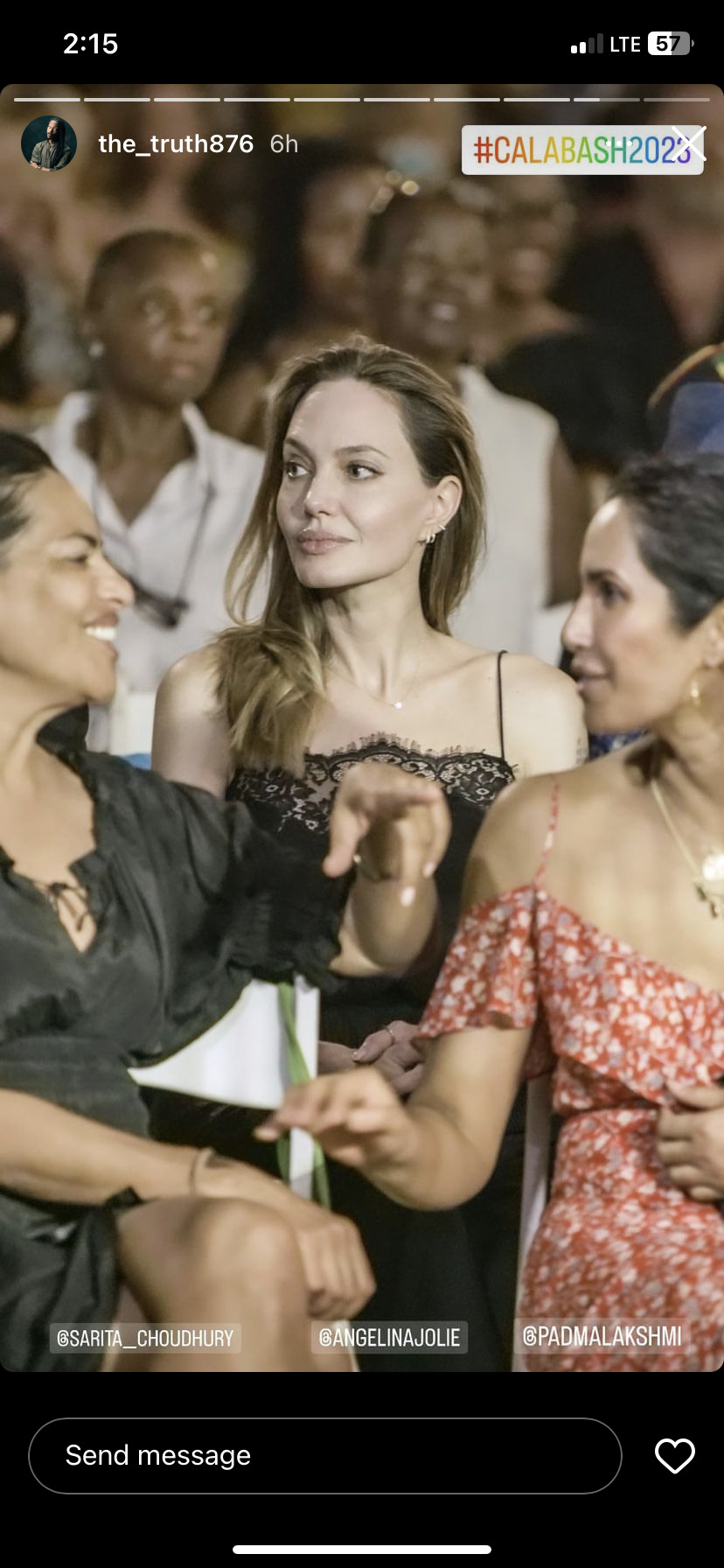




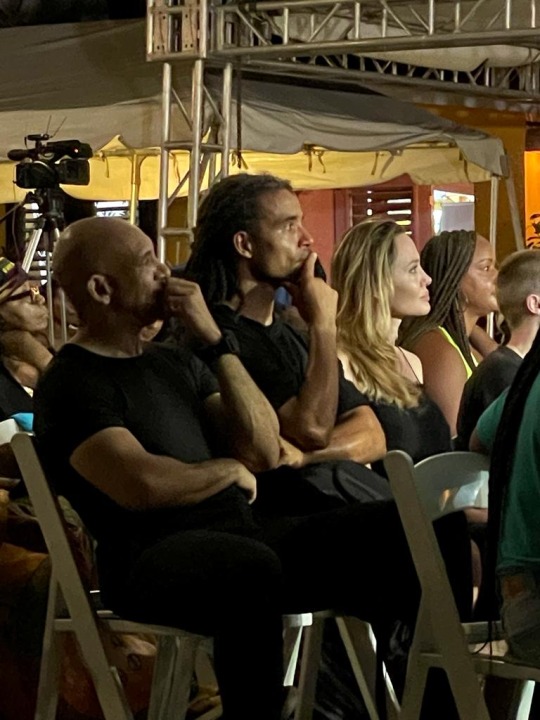
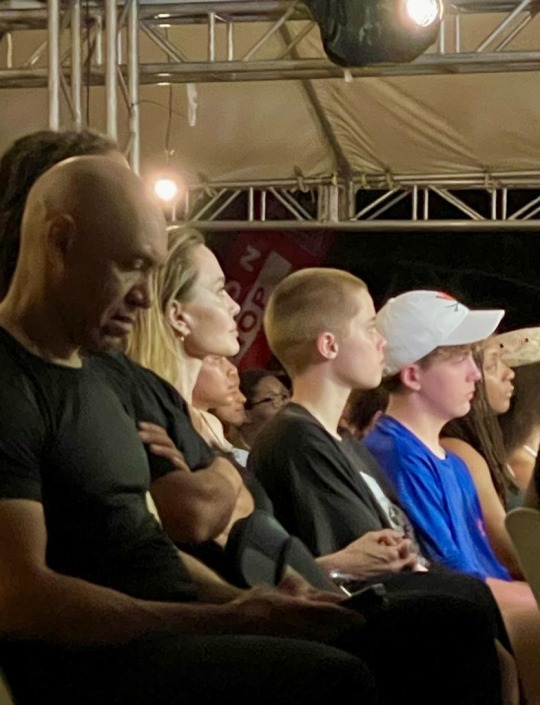
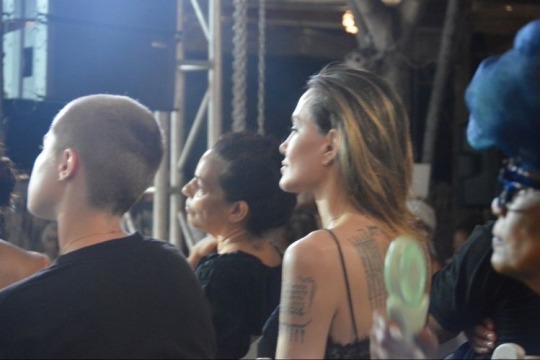
Commissioner Major General Antony Anderson, British rapper and author Akala, Angelina Jolie, watching the segment entitled Laurels and Laureates at Calabash Literary Festival
#angelina jolie#actress#movie star#shiloh jolie pitt#Akala#Jamaica#calabash literary festival#calabash
21 notes
·
View notes
Text
Okie dokie, a long post about Commodities. This is not rigorous scholarship, history is not my field, I knew nothing about this subject before, really. It’s just a quick google. So, without further ado.
“Well, there was this one time I dropped anchor near a small island called Gorée…”
Gorée Island is a small island off the coast of Senegal which played a part in the transatlantic slave trade. The House of Slaves and the Door of No Return, now a museum and UNESCO World Heritage Site, was built in the 18th century. There are so many different estimations of how many people passed through Gorée and different analyses on how important it was to the trade. However, it is important now, and now is when the series was made. It’s a name that carries connotations of not only the lives directly affected by the slave trade then but the continuing repercussions that we’re still seeing and still understanding. There’s an annual festival, “a way to use art and culture to remember [the sad page in history] and to unite the island's diaspora… it is not enough to remember the past, but that it must be used to build a better future in which communities can grow closer to eliminate all forms of discrimination”, (Augustin Senghor, the mayor of Gorée Island, speaking in 2010 about the festival). The Facebook page for the festival says
“Le Gorée Diaspora Festival est un ciment fédérateur entre la Communauté Sénégalaise à travers Gorée et l’ensemble des visages et voix de la diaspora Africaine s’engageant à « rectifier voire inverser les conséquences négatives de l’esclavage et du lourd tribu payé par le continent noir et ses enfants sous le vocable de Renaissance Africaine qui englobe la notion de Développement que l’Afrique n’a pu connaître du fait, justement, de l’esclavage”
I don’t speak French but I can translate a little… the Gorée Diaspora festival is… something about unifying the Senegalese communities through different voices…. Something about reversing and counteracting the consequences of the slave trade, something about a heavy tribute (price?) paid by the ‘children’ of the continent and the diaspora, and includes ideas about the development that Africa could not know because of the slave trade. My dudes, je ne parle pas Francais, so do correct me or translate better.
The Gorée Institute promotes culture and arts in Africa and in 2015 (I think) they ran a poetry residency on the island that aimed “to reignite a literary tradition that has begun to fade, and to help promote arts, culture, and freedom of expression as intrinsically effective methods of fostering open societies in the region”
��How to Fall in Love with an African City
by Gbenga Adesina, a 24-year-old poet from Nigeria
In time, you too will come to learn dear friend, the soft rustle,
Soft whoosh of affection for a city like a lover like a love song: Nairobi, Abuja, Dakar
throbbing in your ribs: Accra, Harare, Port Novo, carving a place for themselves, to nestle
In spite of yourself in the jar
of things you call loved.
I know eyes have their own memories and fears
and you come here seeking only the darkness you’ve been
promised. But come again to Abidjan friend, come to Yamoussoukro, come
to Kigali, to Luanda, to Lagos, where the city vowels sing to you, sing to you.
Sidewalks that are nations on their own. Yellow buses that write you into a story
Wi-Fi spots and shopping malls and smiles that warm your arms and strangers that become
friends in an instant. Grilled meats that introduce your tongue to you.
In time, you too will come to learn dear friend, the soft rustle, soft
Whoosh of affection for a city like a lover like a love song: Nairobi, Abuja, Kigali,
Dakar throbbing in your ribs. What it means for a city to hold you by the hands
and love you and lead you to places you’ve never been inside yourself
again and again at the junction of laughter.
Ok. So, these are a few facts I’ve come up with after a quick Google around, and a few things that are coming out of Gorée today. Back to the series, Bonnaire name drops an island that would have already been involved in the slave trade in the 17th century. The thing about the transatlantic trade was that even when not trading people, trade was deeply involved in slaving. The transatlantic triangle meant that cargo was being shipped to pay for slaves and nurture ties in Africa and supply the colonial settlements, a cargo of people was then shipped to the Americas, then the produce of the Americas was shipped to Europe. Paul Munier, as a trader, was as implicated in the trade as Bonnaire, just a different side of the triangle. His cargo might not have been people, but it would have been from the Americas and in all probability produced by the people taken on Bonnaire’s slave ships. The name-drop, then, is suggestive of the slave trade and brings up a whole host of connotations and connections.
I suppose it was probably put in to suggest to an audience that Bonnaire is a slaver, as a ‘clue’. I think it works beyond that, though. It is also, because of what the island is now, suggestive of a diaspora, and the series brings in Samara, and Porthos, people who are perhaps part of a diaspora (I am not naming Sylvie because her story never brushes on her… what is it Bonnaire calls it? Ah. Here we go: “ancestry”). I don’t know what else is within that allusion, probably many things, but I just wanted to pick up the casual reference and think about it.
http://www.aaregistry.org/historic_events/view/goree-island-home-door-no-return (basic info about the island from an American site. I looked at a lot of sources but this seems the most straightforward)
http://www.nytimes.com/2009/02/19/world/africa/19ndiaye.html (an article about Boubacar Joseph Ndiaye, curator of the House of Slaves, from 2009 after he died)
https://www.voanews.com/a/goree-island-festival-celebrates-african-diversity-107230813/130315.html (quote from Augustin Senghor)
https://www.facebook.com/pg/GoreeDiasporaFestival/about/?ref=page_internal (facebook ‘about’ page)
www.goreeinstitut.org (Gorée Institure’s page, in French)
https://afrolegends.com/2016/07/27/reclaiming-african-history-goree-and-the-slave-trade-in-senegal/ (another page about Gorée and reclamation)
“A calabash. Grows all over West Africa.”
I just want to quickly pick up on this allusion, mostly because it is used to make musical instruments and you know, I like music. So. I’m just gonna share a couple of things I found. The first is a page from RCIP-CHIN [a Canadian… it’s in French again, CHIN stands for Canadian Heritage Information Network, it’s a heritage site basically I think], a teaching page aimed at children about traditional calabash objects from Senegal, so stuff made from calabash, from a region that we know Bonnaire visited.
http://www.virtualmuseum.ca/edu/ViewLoitLo.do?method=preview&lang=EN&id=10659
The Kora is an instrument made from the calabash, so here are two videos of kora music,
https://www.youtube.com/watch?v=XEoMz79NT60 I don’t know this one I got it by googling, it’s called ‘KORA TRIO SENEGAL Konzert Rote Fabrik Zürich’
https://www.youtube.com/watch?v=Ig91Z0-rBfo this one is Sona Jobarteh and band, it says it’s music from West Africa.
Also just a thing from a quick google, A Drunken Ode on an Ashanti Calabash, based on Keats’ Ode to a Grecian Urn, because, you know, how awesome is that?
You bald head crackpot of an unworshipped gourd
Owner of sweet whine, lined with alternate this chord
What incense wafts incessant on your inside
What merry joys accompany your company.
What brave brow, what bold curve
Hairless rim-head, competitor of shaved eggshells
Afraid to touch the earth but on your belly.
Glass wine is sweet, but gourd wine is sweeter
Funeral wine, party wine, you hold them better
What a roll you make on your underbelly
When rocking here this way and that
What browned fare, what fair brow
What endless, gaping gap on your inside
Forever open to wine and air.
Pour me a drink, pour me two
Which are sipped ‘pon suppers supped
Momentous joy for a dugout unleaked
What thin wall, what thick skin
What strong ethers of spirits reek
Shanty half body of insipid taste.
Sleeping is truth, and truth sleeping
Let me now lie and tomorrow waste
https://afrilingual.wordpress.com/2013/11/28/drunken-ode-on-an-ashanti-calabash/
“A bottle of rumbullion. The colonists make it out of sugar molasses, so potent they call it kill devil”
Last allusion I’m picking up, I swear, and again I’ll be quick about it. John J. McCusker says that “rum and molasses early became strategic items in the vital trade with the West Indies, being readily available and readily acceptable returns for colonial goods shipped there. The distilling of rum from molasses created a substantial colonial industry, employing local capital, management skills, and labor[sic]”. Bonnaire’s rum is again just an indication of both his trade and the deeper implications. Rum is a ‘commodity’ (a word McCusker uses over and over that I can’t hear without wincing anymore) that was used substantially in the transantlantic trade. Again, the commodities and luxuries that Bonnaire is shipping, his cargo, is all implicated in the slave trade and, again, I want to point out Paul Munier as a trader who might not actively be a slaver but is still part of the slave trade.
The Rum Trade and the Balance of Payments of the Thirteen Continental Colonies, 1650-1775
Author(s): John J. McCusker
Source: The Journal of Economic History, Vol. 30, No. 1, The Tasks of Economic History(Mar., 1970), pp. 244-247
Published by: Cambridge University Press on behalf of the Economic History Association
Stable URL: http://www.jstor.org/stable/2116737
Accessed: 26-10-2017 20:35 UTC
[sorry, I’m sure there are other more accessible sources on the rum trade and its parallels/uses in the slave trade, but I have google fatigue. The article is focussed on economy and is numbers and ledgers and is only really relevant to show how rum was used by the colonists in the slave trade]
https://www.thoughtco.com/triangle-trade-104592 [oh, here’s another source, and this one talks about the triangle as well]
FINALLY I want to just mention how confused I am by Louis and Richelieu and their conversation about the navy. I always read that as the French didn’t have a navy, and had a trade agreement with Spain about exploration/colonisation. I can’t find any evidence for this, however, and in fact Richelieu pretty much is the source of the modern French navy; he built the damn thing. And in terms of colonization, while it seems to be true that the French in 1630 were only just starting really, they WERE starting. Richelieu [historical type not Capaldi] went on to colonize the Antilles, and the French navy took Gorée from the Dutch in… 1677. David Gegus says that “for the little-studied seventeenth century, some data recently uncovered by Clarence Munford and others are combined with material from older works by Elizabeth Donnan, Abdoulaye Ly, and John Barbot. The compilers note, however, ‘much of the seventeenth century French traffic is missing.’ A large part of France's slave trading was then clandestine, conducted by interlopers challenging royal monopoly companies”. Which seems to fit in with Bonnaire’s position with the court. Richelieu actually set up a Company of San-Christophe with an explorer called Pierre Belain d'Esnambuc in approx. 1626 (“I found myself my own little utopia, a little piece of heaven called San Christophe”). [‘San-Christophe’ is ‘Saint Kitts’]. The company failed, d’Esnambuc died, Richelieu set up the Company of One Hundred Associates instead and they colonised Canada, the Antilles, etc.
https://en.wikipedia.org/wiki/Pierre_Belain_d%27Esnambuc
https://en.wikipedia.org/wiki/Company_of_One_Hundred_Associates
And for those who like academical journalies and JSTOR:
Hausa Calabash Decoration
Author(s): Judith Perani
Source: African Arts, Vol. 19, No. 3 (May, 1986), pp. 45-47+82-83
Published by: UCLA James S. Coleman African Studies Center
Stable URL: http://www.jstor.org/stable/3336411
In the Shadow of the Castle: (Trans)Nationalism, African American Tourism, and GoréeIsland
Author(s): Salamishah Tillet
Source: Research in African Literatures, Vol. 40, No. 4, Writing Slavery in(to) the AfricanDiaspora (Winter, 2009), pp. 122-141
Published by: Indiana University Press
Stable URL: http://www.jstor.org/stable/40468165
Accessed: 26-10-2017 18:30 UTC
The French Slave Trade: An Overview
Author(s): David Geggus
Source: The William and Mary Quarterly, Vol. 58, No. 1, New Perspectives on theTransatlantic Slave Trade (Jan., 2001), pp. 119-138
Published by: Omohundro Institute of Early American History and Culture
Stable URL: http://www.jstor.org/stable/2674421
Mercantilism as a Factor in Richelieu's Policy of National Interests
Author(s): Franklin Charles Palm
Source: Political Science Quarterly, Vol. 39, No. 4 (Dec., 1924), pp. 650-664
Published by: The Academy of Political Science
Stable URL: http://www.jstor.org/stable/2142344
The French Slave Trade: An Overview
Author(s): David Geggus
Source: The William and Mary Quarterly, Vol. 58, No. 1, New Perspectives on theTransatlantic Slave Trade (Jan., 2001), pp. 119-138
Published by: Omohundro Institute of Early American History and Culture
Stable URL: http://www.jstor.org/stable/2674421
Scientific travel in the Atlantic world: the French expedition to Gorée and the Antilles,1681-1683
Author(s): NICHOLAS DEW
Source: The British Journal for the History of Science, Vol. 43, No. 1 (March 2010), pp. 1-17
Published by: Cambridge University Press on behalf of The British Society for theHistory of Science
Stable URL: http://www.jstor.org/stable/40731001
8 notes
·
View notes
Text
Calabash opening night delivers with live entertainment | Entertainment | Jamaica Gleaner
0 notes
Text
The Calabash Experience: Lovers Leap Guest House
The #Calabash Experience: Lovers Leap Guest House
By: Denise N. Fyffe.
Copyright © 2018, Denise N. Fyffe
With bated breath and eager hearts, my Davene and I are eager to reach the cool hills of St. Elizabeth. We have been waiting for months, to experience the world-renowned literary festival, Calabash, at Treasure Beach.
We had a few false starts in trying to leave Kingston.
But by midday, we were finally on our way. For those in the literary…
View On WordPress
0 notes
Text
Jamaica’s Calabash Literary Festival Is the Island’s Best-Kept Secret
Jamaica’s Calabash Literary Festival Is the Island’s Best-Kept Secret
[ad_1]
Sometimes it’s the places that really make you work to get there that leave the most lasting impression. This is what visitors tell themselves as they travel through winding dirt roads and hilly countryside, past makeshift bars with names like “Nuff Vibes,” to a sleepy fishing village called Treasure Beach. There are no high-rise hotels, all-inclusive packages, or kitschy souvenir shops in…
View On WordPress
0 notes